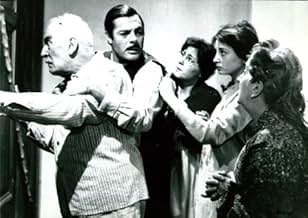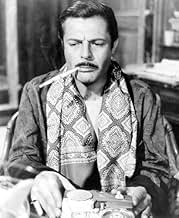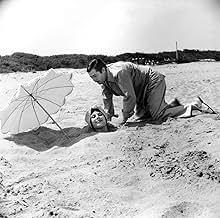IMDb RATING
7.9/10
15K
YOUR RATING
A married Sicilian baron falls in love with his cousin and vows to wed her, but with divorce illegal he must concoct a crime of passion to do away with his wife.A married Sicilian baron falls in love with his cousin and vows to wed her, but with divorce illegal he must concoct a crime of passion to do away with his wife.A married Sicilian baron falls in love with his cousin and vows to wed her, but with divorce illegal he must concoct a crime of passion to do away with his wife.
- Won 1 Oscar
- 12 wins & 9 nominations total
Featured reviews
(Note: Over 500 of my movie reviews are now available in my book "Cut to the Chaise Lounge or I Can't Believe I Swallowed the Remote!" Get it at Amazon.)
Divorzio all'italiana is a richly textured satire of Sicilian macho Catholic life styles starring one of Italy's greatest actors, Marcello Mastroianni. He is a bit Chaplinesque in this tongue in cheek exploration of how to dump your wife and marry your 16-year-old cousin. His wide-eyed, dead pan expressions combined with vulnerability and suave, leading-man good looks made him the heart-throb of women for decades. He plays a bored baron stuck with a baroness (played fatuously by Daniela Rocca) that he cannot abide. It should be noted that today it IS possible to get a divorce in Italy, but at the time it was very difficult, perhaps easier to get an annulment, and so we have the premise of the plot.
Stefania Sandrelli, who became one of the great ladies of the Italian cinema, plays the cousin. She was only 15 when the film was shot but could easily pass for, say, 18. She is sensual, sweet and a bit naughty. In the final scene, famous for its fitting irony, the last thing we see are her feet. I won't tell you more, but the movie is almost worth seeing just for that final scene.
Rocca's Rosalia on the other hand is more syrupy than sweet and would qualify as clinging. She could smother a lumberjack, and although it is not polite to comment unfavorably on a lady's looks, I must note that she seemed to be having a bad facial hair day, everyday. Her impersonation of a country baroness nonetheless was unforgettable. I also liked 16-year-old Margherita Girelli as Sisini, the maid. Her coquettish ways helped to lend a French bedroom farce flavor to the film.
But what really makes this one of the great monuments of the Italian cinema is the witty and delightful script by Ennio De Concini (it won an Academy Award in 1962) and the detailed, textured direction by Pietro Germi. The picture that Germi paints of life in a small Sicilian (or southern Italian, for that matter) village is picturesque, much imitated, and indelible. The crowded ornate clutter of the old estate, the sun-drenched streets and the monolithic stone and mason churches haunt our memory. True, the film starts a bit slowly and drags (at least for modern audiences) a bit at times, but don't make the mistake of giving up on this. The latter half of the film is wonderful. And remember, if you had to go to film school, Divorce Italian Style would be on the syllabus.
So see this for Mastroianni of course but also because no film education would be complete without having seen Divorzio all'italiana.
The Criterion Collection DVD includes a second disc with a documentary on Germi's career, an interview with Ennio De Concini, and screen-test footage of Stefania Sandrelli and Daniela Rocca that I just had to see. There is also a booklet with reviews of the film from Stuart Klawans, Andrew Sarris, and Martin Scorsese. Scorsese's review is adoring and nostalgic since he is from Sicily and since the film had made such a lasting impression on him as a 19-year-old. For him the film was not so much a comedy as a true reflection of a life he and his family had known. He writes, "Every detail in Divorce Italian Style is so truthful and right that all Germi had to do was heighten everything a bit to make it funny."
Divorzio all'italiana is a richly textured satire of Sicilian macho Catholic life styles starring one of Italy's greatest actors, Marcello Mastroianni. He is a bit Chaplinesque in this tongue in cheek exploration of how to dump your wife and marry your 16-year-old cousin. His wide-eyed, dead pan expressions combined with vulnerability and suave, leading-man good looks made him the heart-throb of women for decades. He plays a bored baron stuck with a baroness (played fatuously by Daniela Rocca) that he cannot abide. It should be noted that today it IS possible to get a divorce in Italy, but at the time it was very difficult, perhaps easier to get an annulment, and so we have the premise of the plot.
Stefania Sandrelli, who became one of the great ladies of the Italian cinema, plays the cousin. She was only 15 when the film was shot but could easily pass for, say, 18. She is sensual, sweet and a bit naughty. In the final scene, famous for its fitting irony, the last thing we see are her feet. I won't tell you more, but the movie is almost worth seeing just for that final scene.
Rocca's Rosalia on the other hand is more syrupy than sweet and would qualify as clinging. She could smother a lumberjack, and although it is not polite to comment unfavorably on a lady's looks, I must note that she seemed to be having a bad facial hair day, everyday. Her impersonation of a country baroness nonetheless was unforgettable. I also liked 16-year-old Margherita Girelli as Sisini, the maid. Her coquettish ways helped to lend a French bedroom farce flavor to the film.
But what really makes this one of the great monuments of the Italian cinema is the witty and delightful script by Ennio De Concini (it won an Academy Award in 1962) and the detailed, textured direction by Pietro Germi. The picture that Germi paints of life in a small Sicilian (or southern Italian, for that matter) village is picturesque, much imitated, and indelible. The crowded ornate clutter of the old estate, the sun-drenched streets and the monolithic stone and mason churches haunt our memory. True, the film starts a bit slowly and drags (at least for modern audiences) a bit at times, but don't make the mistake of giving up on this. The latter half of the film is wonderful. And remember, if you had to go to film school, Divorce Italian Style would be on the syllabus.
So see this for Mastroianni of course but also because no film education would be complete without having seen Divorzio all'italiana.
The Criterion Collection DVD includes a second disc with a documentary on Germi's career, an interview with Ennio De Concini, and screen-test footage of Stefania Sandrelli and Daniela Rocca that I just had to see. There is also a booklet with reviews of the film from Stuart Klawans, Andrew Sarris, and Martin Scorsese. Scorsese's review is adoring and nostalgic since he is from Sicily and since the film had made such a lasting impression on him as a 19-year-old. For him the film was not so much a comedy as a true reflection of a life he and his family had known. He writes, "Every detail in Divorce Italian Style is so truthful and right that all Germi had to do was heighten everything a bit to make it funny."
DIVORCE Italian STYLE is a comedy drama about love pains and problems with laws.
An impoverished Sicilian nobleman is married with an unattractive but devoted wife. However, he is in love with his, a much younger and attractive, cousin. He lives, besides his wife, with his elderly parents, his spinster sister and her boyfriend. The divorce was illegal in Italy at that time. He has, unsuccessfully, tried to move away from his wife. Perhaps he will try to kill his wife?! A young cousin is so beautiful. He has a very little time to come up with something. A local story of a woman who killed her husband in a rage of jealousy has gave him a great idea...
This satirical farce, which includes an affair in a marriage, love for a minor girl and a murder of honor is, in spite of moral transgressions, a very interesting film. Mr. Germi has made a series of wonderful plots, in which he has, in a satirical manner, criticized laws in the Italian society. He has, very imaginatively, combined fantasies with reality. Therefore, the malicious actions of the main protagonist seem quite charming. A happy ending is the culmination of irony.
Scenery and music completely correspond with love pains in this film. Characterization is very good.
Marcello Mastroianni as Ferdinando Cefalù is a sympathetic and cunning man at the same time. He, perhaps, goes through a midlife crisis. However, his ambitions and plans, which he has prepared with a large dose of elegance and serenity, are quite childish. His character is filled with pathos, despair and longing. Mr. Mastroianni has offered an excellent performance, which is the foundation of a top class entertainment in this film.
His support are Daniela Rocca (Rosalia Cefalù) as his boring wife, Stefania Sandrelli (Angela) as his passion, lust and love and Leopoldo Trieste as Carmelo Patanè as his "salvation".
This is a very entertaining movie about love torments and...still "natural laws".
An impoverished Sicilian nobleman is married with an unattractive but devoted wife. However, he is in love with his, a much younger and attractive, cousin. He lives, besides his wife, with his elderly parents, his spinster sister and her boyfriend. The divorce was illegal in Italy at that time. He has, unsuccessfully, tried to move away from his wife. Perhaps he will try to kill his wife?! A young cousin is so beautiful. He has a very little time to come up with something. A local story of a woman who killed her husband in a rage of jealousy has gave him a great idea...
This satirical farce, which includes an affair in a marriage, love for a minor girl and a murder of honor is, in spite of moral transgressions, a very interesting film. Mr. Germi has made a series of wonderful plots, in which he has, in a satirical manner, criticized laws in the Italian society. He has, very imaginatively, combined fantasies with reality. Therefore, the malicious actions of the main protagonist seem quite charming. A happy ending is the culmination of irony.
Scenery and music completely correspond with love pains in this film. Characterization is very good.
Marcello Mastroianni as Ferdinando Cefalù is a sympathetic and cunning man at the same time. He, perhaps, goes through a midlife crisis. However, his ambitions and plans, which he has prepared with a large dose of elegance and serenity, are quite childish. His character is filled with pathos, despair and longing. Mr. Mastroianni has offered an excellent performance, which is the foundation of a top class entertainment in this film.
His support are Daniela Rocca (Rosalia Cefalù) as his boring wife, Stefania Sandrelli (Angela) as his passion, lust and love and Leopoldo Trieste as Carmelo Patanè as his "salvation".
This is a very entertaining movie about love torments and...still "natural laws".
Definitely a classic film, but not just an Italian classic! "Divorzio all'italiana" centers itself around Ferdinando Cefalù (Mastroianni), a 37 year old baron in a small town. Although he's a baron, his life is not completely perfect as his father has squandered much of their money, and his extremely clingy wife Rosalia stands between him and the only thing he loves, his 16 year old cousin Angela. To add salt to the wound, 1960's Italy does not allow couples to divorce, which leads Ferdinando to seek desperate measures. After a town scandal erupts, when a woman murders her cheating husband to protect her honor, Ferdinando is inspired to set up his wife with a lover in order to kill her and "protect his honor." The rest of the movie chronicles Ferdinando's attempts to find someone who would fit the bill.
"Divorzio all'italiana" is a satirical look at Italian society and its seemingly backward laws which force people to do stupid things and its fallibility at justice. In its social commentary of Italian laws/society, Concini, Germi, and Giannetti (the writers) create well fitted, stereotypical characters that are much needed in order for the message of the film to get across. Ferdinando plays the evil nobleman, Rosalia as the annoying wife, Angela as the desirable secret teen lover, etc. The beauty of the story not only lies in it's scathingly funny humor, with Ferdinando's clever plotting and hallucinations of killing his wife, but also in its ability to transcend time. Nowadays there are no laws that forbid divorce in most societies, but even though that crucial point does not relate to modern audiences, the film is still able to conjure emotions for the characters' plight. Another great thing about the film, is the idea of a protagonist character with typically antagonist characteristics. Ferdinando is definitely a bad man, but the story plays with the audience in making them want Ferdinando to succeed in his plot. To add to the underlying theme of the film, the failure of Italian laws, is the theme of "justice" whether it be from the law or from a simple reversal of fate. Definitely watch the film up to the very end, as it closes with an ironic yet justified twist of fate for the characters involved.
"Divorzio all'italiana" is a satirical look at Italian society and its seemingly backward laws which force people to do stupid things and its fallibility at justice. In its social commentary of Italian laws/society, Concini, Germi, and Giannetti (the writers) create well fitted, stereotypical characters that are much needed in order for the message of the film to get across. Ferdinando plays the evil nobleman, Rosalia as the annoying wife, Angela as the desirable secret teen lover, etc. The beauty of the story not only lies in it's scathingly funny humor, with Ferdinando's clever plotting and hallucinations of killing his wife, but also in its ability to transcend time. Nowadays there are no laws that forbid divorce in most societies, but even though that crucial point does not relate to modern audiences, the film is still able to conjure emotions for the characters' plight. Another great thing about the film, is the idea of a protagonist character with typically antagonist characteristics. Ferdinando is definitely a bad man, but the story plays with the audience in making them want Ferdinando to succeed in his plot. To add to the underlying theme of the film, the failure of Italian laws, is the theme of "justice" whether it be from the law or from a simple reversal of fate. Definitely watch the film up to the very end, as it closes with an ironic yet justified twist of fate for the characters involved.
This is definitely one of the best Italian comedies ever made, a movie you can watch over and over again, Well paced, beautifully scored, perfectly set and cast but most of all flat out funny "Divorzio all'italiana" clicks on all cylinders from start to finish.
This classic Italian film is a comedy that tells the story of Ferdinando Cefalu who is unhappily married for 15 years, but he falls in love with his wife's niece, and he starts a plan to end his marriage and not be criticized by the old and classy Italian society. In the meantime, in order to complete his plan many things happened including funny moments and some dramatic moments. The movie seems to have been very well directed and very well acted and gives us a little hint about the behavior of the Sicilian society. In order to do his plan, Ferdinando chooses a crazy idea, and takes a long time to plan and detail his plan perfectly having a lot of funny interruptions during the process of his plan. Its refreshing to find movies with good sense of humor, and no use of vulgarities or bad language to make the viewers laugh. I really enjoyed it, and i deeply recommend watching it.
Did you know
- TriviaThe "honor killing" law, which provided mitigating circumstances for anyone who killed his "spouse, daughter or sister" (or their lover) upon discovering them "in illegitimate carnal relations", was definitely abrogated in Italy in 1981, exactly 20 years after the release of this movie.
- GoofsWhen Ferdinando gets in bed with Rosalia after their fight, Rosalia's head facings change significantly between shots.
- Quotes
Ferdinando Cefalù: Have you really got another headache?
- ConnectionsEdited into Lo schermo a tre punte (1995)
- How long is Divorce Italian Style?Powered by Alexa
Details
- Release date
- Country of origin
- Language
- Also known as
- Scheidung auf italienisch
- Filming locations
- Ispica, Ragusa, Sicily, Italy(the Cefalus' hometown)
- Production companies
- See more company credits at IMDbPro
Box office
- Gross worldwide
- $131,467
- Runtime1 hour 45 minutes
- Color
- Aspect ratio
- 1.85 : 1
Contribute to this page
Suggest an edit or add missing content


![Watch Trailer [OV]](https://m.media-amazon.com/images/M/MV5BY2IwZTI1YmUtNTg4YS00OTNlLTkyYjUtZTE5ZjA5MTc4OGI1XkEyXkFqcGdeQXRyYW5zY29kZS13b3JrZmxvdw@@._V1_QL75_UX500_CR0)


























